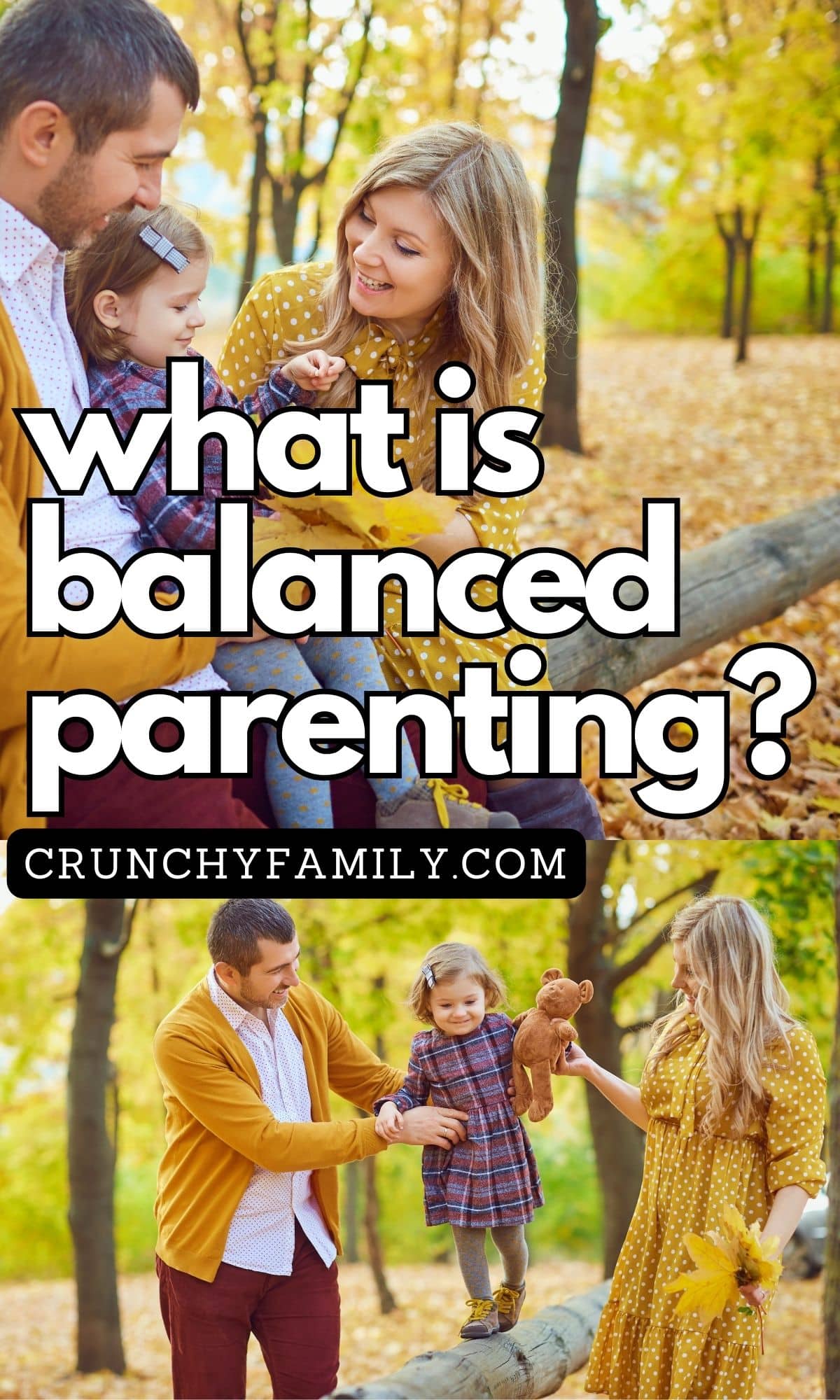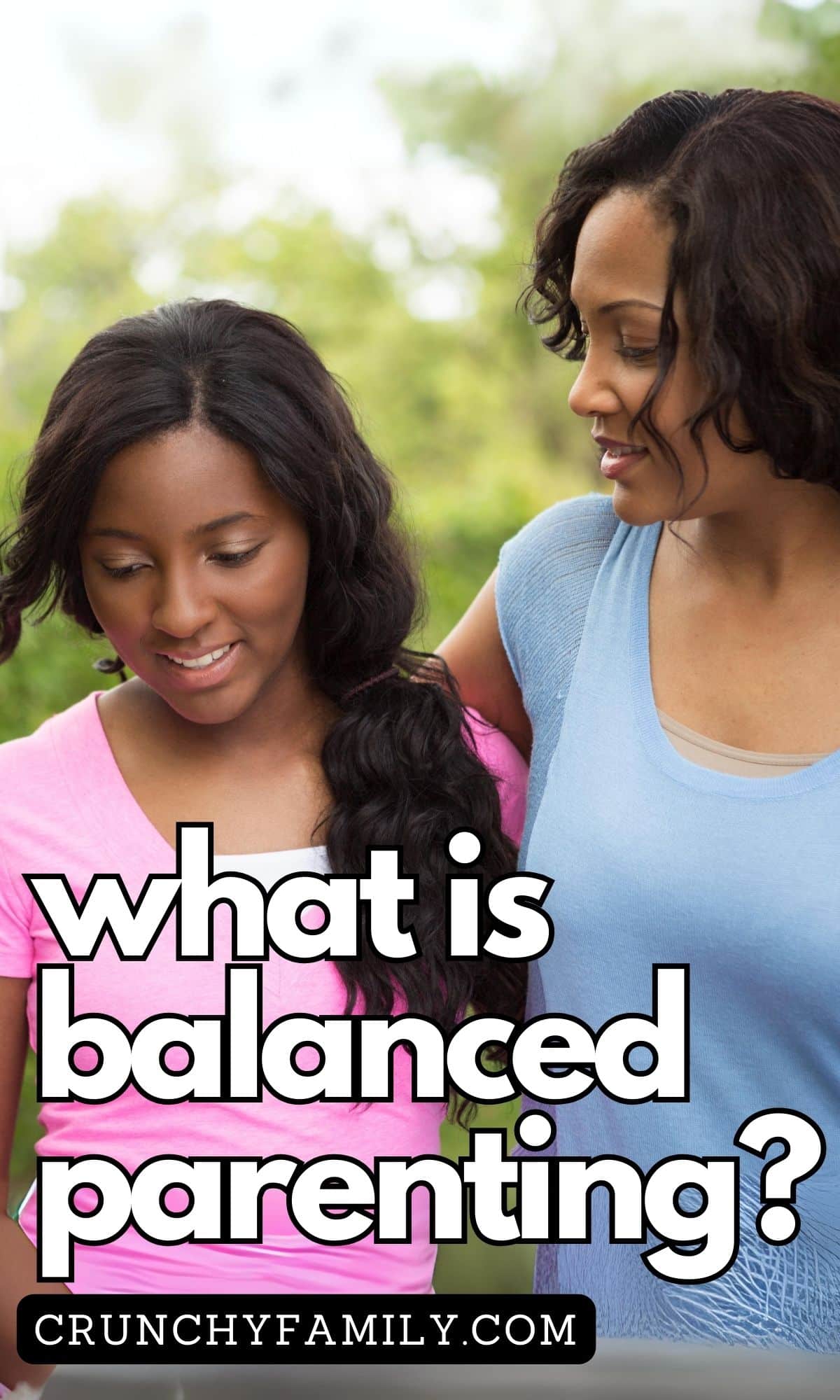Parenting is an ever-evolving journey filled with both triumphs and challenges, and when it comes to parenting styles it’s easy to get caught up in the semantics, especially in this online age where it can be tempting to put a label on everything.
Balanced parenting fits into the category of authoritative parenting – just like gentle parenting. There’s a reason we posted a list of the alternative names for gentle parenting, and that’s because often even while using different labels, we actually find a lot of similarities and often we are on the same page whether we call ourselves gentle parents, authoritative parents, or balanced parents.
And despite all of the labels, the essence of parenting remains constant—doing our utmost to nurture and guide our children.

Understanding this, it’s helpful to know that parenting methodologies are broadly categorized into four styles: authoritarian, authoritative, permissive, and neglectful. Among these, the balanced or authoritative style is a harmonious blend that many parents strive toward.
So bearing that in mind, let’s take a look at what balanced parenting is all about.
Balanced parenting is a parenting style for those seeking a middle ground between discipline and freedom, guidance and autonomy.
Often synonymous with “authoritative parenting” or referred to as “gentle parenting,” this approach is about forging a path that reflects understanding, respect, and a deep commitment to fostering healthy child development.

This approach is neither overly strict nor dismissively lax. It respects the individuality of the child while maintaining the scaffolding necessary for healthy development.
As we dive deeper into what makes balanced parenting both a method and a goal, remember that many of us are on a journey to transcend our own upbringings. We’re not just raising children; we’re aiming to elevate the entire parenting paradigm. Whether you’re fine-tuning your parenting approach or overhauling it completely, let’s explore how balanced parenting can be a game-changer in the way we nurture the next generation.
The History of Parenting Styles
Historically, psychologists have identified four main parenting styles: authoritarian, authoritative, permissive, and neglectful.
Each style offers a unique approach to raising children, impacting everything from their mental health to their social behaviors, but we would argue that all of those in the authoritarian, permissive and neglectful parenting styles are not suitable for today’s parents, and can be harmful to children in one way or another.
So the balanced parenting style, nestled within the authoritative category, is known for its effective blend of structure and empathy.

Authoritarian vs. Authoritative: Understanding the Differences
Authoritarian parents are often seen as strict, using a high-discipline, low-warmth approach. This strict parenting style is what you think of when you have children who are afraid to admit their mistakes, and perhaps physical discipline is being used in the home, or harsh punishments without understand and empathy for the child.
In contrast, balanced or authoritative parents combine high expectations with high responsiveness, creating an environment where rules are clear but communicated through a lens of support and mutual respect, and gentle discipline is used.
Related: 6 Gentle Parenting Alternatives to Time Out
Permissive and Neglectful Parenting
On the other side of the spectrum are permissive parents, who provide ample freedom but may lack the necessary boundaries that children need to thrive.
Permissive parenting often involves a high level of responsiveness but low demands. Parents may set few boundaries and rules, which can lead to children lacking discipline and self-regulation skills. While these parents are typically loving and communicative, their reluctance to enforce rules can sometimes hinder their child’s development of important life skills.
Neglectful parenting, or uninvolved parenting, is the the least involved style and offers minimal interaction, leaving children to largely fend for themselves.
This extremely hands off parenting style can severely affect the emotional and psychological growth of these kids and teens, and they feel they are out there on their own without any parental care or concern for their wellbeing.

The Heart of Balanced Parenting
Balanced parenting champions a nurturing approach where parents are responsive to their children’s needs while setting firm boundaries. Let’s take a look at some of the balanced parenting characteristics….
Responsiveness
Parents are attuned to their child’s emotional and physical needs, responding promptly and appropriately, which fosters a secure attachment.
Encouragement and Support
Balanced parents provide encouragement and celebrate efforts as much as achievements, fostering self-esteem and resilience in their children.
Related: 10 Powerful Reasons Why Kids Need Role Models
Discipline Through Guidance
Instead of punitive measures, discipline is approached through guidance, helping children understand the consequences of their actions and the value of making good choices.
Open Communication
Balanced parents encourage open dialogue, allowing children to express their feelings and opinions respectfully. This fosters mutual understanding and emotional connection. There’s a strong emphasis on open and honest communication. Children feel heard and are encouraged to express their thoughts and feelings.
Consistent Rules
While the home environment is loving and empathetic, it is also structured. Rules are clear but not rigid, allowing room for discussion and adaptation based on the child’s growing needs.
Rules and expectations are clear and consistent, but not rigid. Adjustments are made based on the child’s age, understanding, and circumstances.
Empowerment through Choices
Children are given choices within defined limits. This not only enhances their decision-making skills but also boosts their self-esteem.
Recognition of Individuality
Acknowledging that each child has unique needs and strengths is crucial. Balanced parents adapt their parenting style accordingly, which promotes personalized child development.
Balanced Parenting Examples
A vivid example of balanced parenting can be seen in how a parent handles a situation where a child fails a test. Instead of reacting with severe punishment like an authoritarian parent or indifference like a neglectful parent, a balanced parent would sit down with the child to discuss what went wrong.

They would express understanding for the child’s feelings of disappointment while also discussing the importance of studying and learning from mistakes.
Together, they might come up with a study plan that includes both supportive measures, like scheduled study time together, and independent tasks for the child. This approach teaches accountability alongside nurturing support.
Related: 15 Key Phrases to Embrace and Avoid with Your Child
Opting for a balanced parenting style can profoundly impact a child’s mental and emotional health. Family therapists often advocate for this approach as it helps in building resilience, emotional intelligence, and social skills in children.
By providing a stable yet flexible environment, balanced parents prepare their children to face the world with confidence and adaptability.

The Outcome of Balanced Parenting
Ideally, balanced parenting leads to balanced children and a balanced family environment. When children are raised with a mixture of firmness and kindness, they tend to develop better emotional regulation, social skills, and confidence.
These children are more likely to approach the world with empathy and adaptability, reflecting the balanced support and structured guidance they received at home. In this nurturing environment, every family member thrives, contributing to a well-rounded, harmonious family life.

Many of us strive to break cycles of ineffective parenting experienced in our own upbringing. Embracing a balanced approach requires patience and perseverance. Resources such as parenting workshops, books, and consultations with family therapists can provide invaluable support.
Remember, the goal isn’t to be a perfect parent but a balanced one, who continually evolves and adapts in response to their child’s growth.
Balanced parenting is a philosophy that emphasizes the health and well-being of the entire family. It requires work, commitment, and a heartfelt desire to understand and nurture our children’s needs.
As we navigate the complexities of parenting, let us aim to be balanced parents—firm in our principles yet flexible in our approach, always prioritizing the mental health and happiness of our children.
In this journey, let’s support each other as parents and guardians, sharing experiences and resources, and always remembering that in the realm of parenting, being balanced is not about perfection, but about creating a home environment where every family member can thrive, with high expectations and standards but the space to understand that they can bring any problems or worries to us as parents, and that we will help them through with warmth and understanding.
More on Gentle Parenting
- Setting Boundaries in Gentle Parenting
- Common Gentle Parenting Myths
- What is Gentle Parenting and Why Practice It with Your Kids?
- 8 Alternative Names for Gentle Parenting
- 10 Powerful Reasons Why Kids Need Role Models
- Natural Ways to Reduce Anxiety In Children

1 thought on “What Is The Balanced Parenting Approach?”